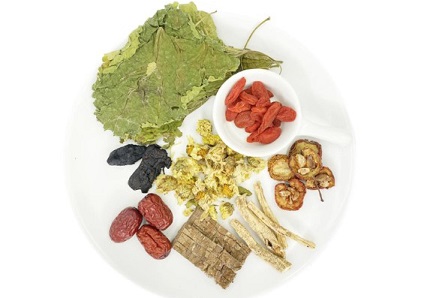New Hope for Kidney Recovery: Traditional Chinese Medicine's Role in Renal Regeneration
Nikhil Prasad Fact checked by:Thailand Medical News Team Jun 05, 2024 1 year, 7 months, 1 week, 2 days, 6 hours, 34 minutes ago
TCM News: Kidney health is paramount for overall well-being, but acute kidney injury (AKI) remains a significant clinical challenge with high morbidity and mortality rates. Despite advancements in medical science, there is still no ideal clinical treatment for AKI. This
TCM News report explores the promising role of Traditional Chinese Medicine (TCM) in renal regeneration, focusing on repairing renal tubular epithelial cells, peritubular capillaries (PTCs), and regulating immune cells. By delving into the mechanisms of TCM, researchers from Affiliated Hospital of Shandong University of Traditional Chinese Medicine, Jinan, China aim to shed light on potential new avenues for treating AKI.
 New Hope for Kidney Recovery - Traditional Chinese
New Hope for Kidney Recovery - Traditional Chinese
Medicine's Role in Renal Regeneration
Understanding Acute Kidney Injury
AKI is characterized by the sudden loss of kidney function, primarily caused by injury to the proximal renal tubules. This condition is often accompanied by microvascular damage and immune system activation. The kidneys possess an intrinsic ability to repair damage through the activation of resident renal progenitor cells and mesenchymal stem cells (MSCs), which proliferate and differentiate to restore function. However, severe or prolonged injury can overwhelm these repair mechanisms, leading to chronic kidney disease (CKD).
The Role of Renal Progenitor Cells
Renal progenitor cells are essential for repairing damaged kidney tissue. Studies have identified two key types of renal progenitor cells involved in AKI repair: CD133+CD24+ and Sox9+ cells. These cells proliferate rapidly after injury, replacing lost tubular cells and restoring renal function. However, the clinical application of exogenous progenitor cells faces challenges such as immune rejection, making the activation of endogenous progenitor cells a more promising approach.
Research has shown that the expression of Sox9, a key transcription factor, is crucial for the activation of renal progenitor cells. Various signaling pathways, including EGFR/ERK1/2 and Notch, regulate Sox9 expression during kidney injury. Moreover, hypoxia-inducible factors (HIFs) and the protein ZFP24 also play significant roles in Sox9 activation, promoting kidney repair.
Mesenchymal Stem Cells in Kidney Repair
MSCs, derived from sources like bone marrow and adipose tissue, are multipotent cells capable of differentiating into various cell types, including renal tubular epithelial cells. MSCs can migrate to injured sites, modulate immune responses, and secrete paracrine factors that aid in tissue repair. Studies have demonstrated that MSCs can improve renal function in AKI models by differentiating into renal cells and through their paracrine effects.
TCM has shown potential in enhancing the therapeutic effects of MSCs. For instance, muscone, a compound found in musk, has been shown to improve the bioactivity of bone marrow-derived MSCs, enhancing their proliferation, secretion, and migration. Similarly, Bailing capsules, der
ived from Cordyceps, have been found to enhance the proliferation of human amniotic MSCs, significantly improving renal function in nephrotic syndrome models.
Repairing Peritubular Capillaries
PTC damage is a hallmark of AKI and a significant risk factor for the progression to CKD. Repairing these microvessels is crucial for restoring kidney function. Research has shown that renal tubular cells can promote PTC proliferation by secreting extracellular vesicles containing VEGF-A, a key factor in angiogenesis. Additionally, the transplantation of MSCs has been found to promote PTC repair and improve kidney injury outcomes.
TCM has demonstrated efficacy in promoting capillary regeneration. Salvianolic acid A, a compound derived from Salvia miltiorrhiza, has been shown to maintain PTC density and alleviate kidney damage by promoting VEGF-A expression. Similarly, an Astragalus danggui decoction has been found to enhance renal function by promoting PTC and glomerular capillary regeneration through VEGF upregulation.
Immune System Regulation
Macrophages play a critical role in kidney repair, bridging the gap between inflammation and tissue regeneration. However, an overactive immune response can exacerbate kidney damage. The balance between pro-inflammatory (M1) and anti-inflammatory (M2) macrophages is crucial for effective kidney repair.
RA signaling has been identified as a key pathway in macrophage-driven kidney repair. Locally synthesized RA inhibits pro-inflammatory macrophages and promotes the activation of M2 macrophages, facilitating renal epithelial cell repair. Additionally, macrophages secrete cytokines such as IL-22 and lipocalin-2 (Lcn-2), which are vital for epithelial cell regeneration and injury repair.
TCM's Role in Modulating Macrophages
TCM can modulate macrophage activity to enhance kidney repair. Danhong injection, for example, has been shown to reduce macrophage infiltration and alleviate AKI caused by ischemic reperfusion. Resveratrol, a compound found in various plants, can inhibit inflammatory responses in macrophages, reducing kidney damage in AKI models.
Furthermore, regulating the balance of M1/M2 macrophage polarization is a potential therapeutic target for AKI. Studies have shown that compounds like berberine can promote the transformation of macrophages into the M2 type, enhancing tissue repair. Curcumin, another TCM compound, has been found to promote the secretion of anti-inflammatory cytokines and the polarization of M2 macrophages, aiding in kidney repair.
Conclusion and Future Perspectives
The potential of TCM in renal regeneration and AKI repair is promising. By activating renal progenitor cells, enhancing MSC function, promoting capillary regeneration, and modulating immune responses, TCM offers a multifaceted approach to kidney health. However, further research is needed to fully understand the mechanisms and optimize the use of TCM in clinical settings.
As scientific understanding of kidney regeneration advances, integrating TCM with modern medical practices could lead to more effective treatments for AKI and CKD. By harnessing the body's natural healing abilities and the therapeutic properties of TCM, we can move closer to improving outcomes for patients with kidney injuries.
The study findings were published in the peer reviewed journal: Chinese Medicine (Springer Link).
https://link.springer.com/article/10.1186/s13020-024-00935-9
For the latest
TCM News, keep on logging to Thailand Medical News.
Read Also:
https://www.thailandmedical.news/news/covid-19-herbs-harvard-led-study-shows-effectiveness-of-various-herbs-used-in-traditional-chinese-herbal-formulations-for-treating-covid-19
https://www.thailandmedical.news/news/phytochemicals-quercetin,-puerarin-and-kaempferol-found-predominantly-in-traditional-chinese-medicine-tcm-can-inhibit-sars-cov-2-infection
https://www.thailandmedical.news/news/must-read-china-s-secret-to-controlling-the-covid-19-outbreak-is-traditional-chinese-medicine-concoctions-used-alone-or-in-conjunction-with-antiviral-
